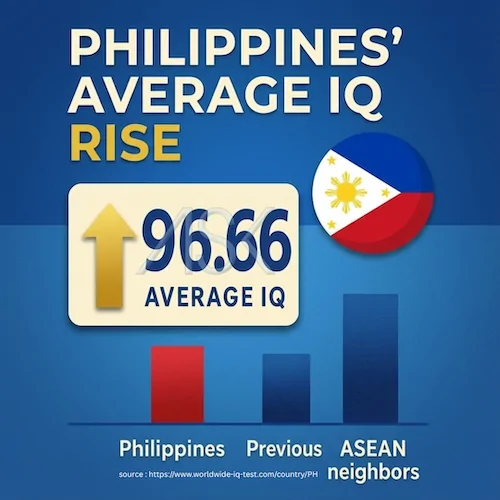Discussions about a country’s “average IQ” often surface in online rankings and viral charts, but these figures are frequently misunderstood and overinterpreted. This article does not attempt to judge intelligence or rank Filipinos as a people. Instead, it examines how recent reported cognitive test data from online platforms is being discussed — and why national capacity, workforce skills, education outcomes, and adaptability are far more meaningful indicators of a country’s real-world potential.
Using the Philippines as context, this piece reframes the conversation from numbers to capability — asking what truly reflects human capital development in 2025, and why intelligence should be understood as something strengthened by systems, opportunities, and skills rather than reduced to a single score.
2025 Analysis: How the Philippines’ Average IQ Improved
The narrative seems to be changing. In 2025, the Philippines’ average IQ rose to 96.66, this updated figure is based on expanded datasets from WorldWide-IQ-Test.com, reflecting a broader and more inclusive pool of test-takers.

Introduction: Philippines’ Average IQ in ASEAN Context
For many years, Filipinos carried the stigma of having the “lowest IQ in ASEAN,” a claim built on older studies that listed averages between 81 and 86. With more recent and larger datasets now available, that narrative is deserves a second look with the updated evidence.
How ASEAN IQ Averages Changed Since 2020
Across ASEAN, average IQ scores have shifted in the past five years. Below is a consolidated view of the latest data compared to earlier measurements:
| Country | Average IQ (2025) | Previous Score |
|---|---|---|
| Singapore | 105.14–106.18 | 105.89 (2023) |
| Vietnam | 101.45 | 100.09 (2022) |
| Malaysia | 99.55 | 92.88 (2020) |
| Thailand | 98.46–101.52 | 93.87 (2020) |
| Myanmar | 97.39–97.37 | 91.18 (2020) |
| Philippines | 96.66 | 86 / 81.64 (2021) |
| Laos | 93.97 | 89.02 (2020) |
| Indonesia | 93.18 | 87.74 (2020) |
| Cambodia | 92.05 | 84.75 (2020) |
Sources: WorldWide-IQ-Test.com, Facebook ASEAN IQ 2025
Quick Insight: Every ASEAN country showed improvement from previous years, but the Philippines marked one of the most pronounced jumps.
Understanding ASEAN IQ Rankings
Global online IQ rankings can be useful for observing broad patterns, yet it is important to note that they rely on voluntary participation, typically from individuals with stable internet access. Because test-taking populations are self-selecting, these rankings should be seen as indicators—not definitive national intelligence scores. For additional comparative context, you may explore the CEOWorld Global IQ Rankings (2025).
What’s Driving the Change in the Philippines’ Average IQ?
The upward trend is attributed to improvements across multiple development pillars:
- Stronger national investment in digital literacy and STEM programs
- Enhanced nutrition and maternal health programs supporting early childhood development
- Broader and more equitable access to basic education for both urban and rural learners
These factors collectively strengthen cognitive foundations and learning outcomes. You can explore additional educational strategies through this resource:
Philippines Education Reform Analysis (PNA, 2025).
Implications: Cognitive Performance and Holistic Intelligence in the Philippines
A rising average IQ aligned with ASEAN neighbors is a positive signal for national competitiveness. Still, experts emphasize that long-term success in the 21st century requires a balanced model of intelligence—valuing emotional, creative, social, and practical intelligence alongside cognitive ability.
ASK Framework Application for the Philippines’ Rising Average IQ
ALIGN – Align systems, understanding, and narratives
- Align public understanding with updated, data-driven insights on the Philippines’ average IQ.
- Replace outdated stigma (“lowest in ASEAN”) with verified evidence and broader global context.
- Strengthen alignment between education policy, digital learning initiatives, and long-term national development goals.
STRENGTHEN – Strengthen foundations that elevate national cognitive readiness
- Invest in STEM learning, digital literacy, and early childhood education programs to build long-term intellectual capital.
- Support community-based nutrition and maternal health programs proven to influence cognitive development.
- Strengthen public–private partnerships that widen access to quality education in underserved areas.
KICKSTART – Kickstart culture shifts and future-ready intelligence
- Normalize conversations around holistic intelligence — IQ, EQ, creativity, adaptability, and socio-emotional skills.
- Kickstart initiatives that encourage critical thinking, media literacy, and responsible digital behavior.
- Promote community and school programs that celebrate resilience, curiosity, and problem-solving — traits essential for future competitiveness.
References and Further Reading
- WorldWide-IQ-Test.com Philippines, 2025
- CEOWorld 2025 Global IQ Rankings
- Philippines Education Reform Analysis (PNA)
For additional context on the Philippines’ long-term standing in ASEAN, explore our earlier analysis:
Hello ASEAN.
FAQ
Is the Philippines’ average IQ really improving?
Yes. Based on newer datasets from sources like Worldwide-IQ-Test.com, the Philippines’ reported average IQ has risen to 96.66 in 2025. While not a perfect measure, this reflects broader access to testing and shifts in education and digital literacy.
Why were older studies showing much lower IQ scores?
Earlier datasets used smaller samples, outdated methodologies, or limited demographic representation. Global online IQ test platforms now gather more diverse respondents, offering broader (though still imperfect) indicators.
Does a higher national average IQ guarantee economic progress?
No. IQ is only one factor. Economic growth also depends on emotional intelligence, creativity, opportunities, governance, and systemic support such as education, health, and stable institutions.
Are online IQ test results reliable?
Online tests can show trends but are not definitive measures of national intelligence. Results often reflect who has access to internet-based tests rather than the true population average.
How can the Philippines further enhance cognitive development?
Strengthening early childhood programs, improving nutrition, expanding digital access, and integrating critical thinking and STEM learning are among the most effective strategies.
💡 The ASK Takeaway
This topic aligns with our ASK Framework — Align • Strengthen • Kickstart — as we champion data-driven awareness, stronger systems for learning, and cultural shifts that develop holistic intelligence.
- Align public understanding with updated, evidence-based insights.
- Strengthen education, nutrition, and digital programs that uplift cognitive performance.
- Kickstart smarter conversations around holistic intelligence — IQ, EQ, adaptability, and creativity.
Discover the full framework →
ASK Framework Cornerstone Page





